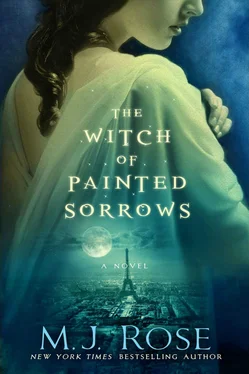I loved her because she was my beautiful mother, and to be in her presence was to be treated to the scents of lilies and violets, to the sight of cornflower-blue eyes and skin as lustrous as pearls. I loved her, not because of how she thought or the things she said but because she cared for me and showered me with affection. But beneath her attentions I always thought she was uncomfortable around me. Once, as she brushed my hair off my face, she said, “How did I ever give birth to such a serious, dark little girl?” Unspoken was the rest of the sentence: . . . when I’m so light, so frivolous .
From her I’d learned what would be expected of me. To marry well and raise a family. To create an oasis of calm in my home, to love and support my husband and be a good mother to my children. Now it seemed I’d never follow the example she’d set.
Alice, who had riotous blond curls and a strong chin, brought in a tray of fine china cups and the silver chocolat chaud pot, with its long spout and horizontal ebony handle. There was also a plate of delicate golden madeleines dusted with powdered sugar.
“There is so much to say,” Grand-mère began as she poured me some of the aromatic brew. “But first, nourishment.” She handed me a fragile cup and saucer. I waited until she poured for herself, and then I took the first heady sip. Of all the things that meant Paris and my grandmother to me, it was our afternoon ritual of sharing this melted chocolate drink, so unlike that thin American cocoa, and talking over what I’d done that day.
Thinking of how different this conversation was going to be brought tears to my eyes. I blinked them back, but she saw and, reaching up her sleeve, withdrew a black lace handkerchief with her initials embroidered in fire orange, handing it to me.
Like the fire opals she wore, these black handkerchiefs, scented with her perfume, were part of her signature. Dabbing at my eyes, I smelled that amazing fragrance that no one wore but my grandmother: roses and lily of the valley with a hint of vanilla and spicy pepper and some magical ingredient that smoothed it out and ignited it. The scent had been created for her by the great perfumer Monsieur L’Etoile, whom Grand-mère called a “dear friend.” She called each man who visited her salon a “dear friend”—or, as she said, “ mon cher ami .” L’Etoile had named the scent after her, calling it L’Incendie, and promised he’d never sell it to anyone else during her lifetime.
“When did you last eat?” my grandmother asked.
I had to think. “I had breakfast on the boat. A soft-boiled egg and toast.”
“That was practically yesterday. You are too thin, besides. I know how upset you must be, but you still have to rail against the fates, Sandrine. Never give in to sorrow. It doesn’t do your heart or your complexion any good.”
I smiled.
“So you know about Papa?”
I had come to Paris assuming I would have to be the one to tell her, but it appeared I’d be spared that horror.
“I received a telegram,” she said. “But there is still so much I don’t understand that I am going to need you to explain. Why didn’t you contact me? Why did you leave so soon after the funeral? Where is your husband?”
“I wanted to send you a telegram. I wrote it a dozen times. But in the end I couldn’t tell you the news that way. Once I knew I would be coming, I thought I’d tell you when I got here. Who sent you the news?”
My father had no family but me in America, and I couldn’t imagine who would have known to contact Grand-mère.
“Your father’s lawyer, Monsieur Lissauer. He is the only person outside of you and your mother whom your father ever told about me and the only one who would know to get in touch.”
I had not understood that Grand-mère was different from my friends’ grandmothers until the summer I turned thirteen and she spent the season with us in Newport.
One night she came down to dinner wearing a pearl necklace that wrapped around her throat twice and yet still reached her waist.
Even though my mother had beautiful jewels, I’d never seen anything like Grand-mère’s pearls. Lustrous against her navy silk gown, they looked like tiny moons stolen out of a midnight sky.
She saw me staring and asked if I liked them. When I said I did, she took them off and hung the rope around my neck, telling me they were mine to wear while she was visiting.
“Oh, thank you,” I said as I touched the pearls, exploring their smooth surface with my fingertips. “When I grow up, I will have a necklace just like this and never take it off,” I whispered.
“Hopefully you’ll be given it as a gift and not have to work for it,” my mother said a bit haughtily.
My grandmother smiled sadly at her daughter-in-law. “My dear, there’s no such thing as not having to work for it, even if you are a respectably married woman of leisure.”
Later I asked my father what my mother had meant and why Grand-mère had seemed insulted.
“Your grandmother,” my father explained, “is an independent businesswoman with a razor-sharp mind who has made a career for herself in the art of giving pleasure. Not everyone in America finds it a respectable profession, but in France, in Paris, she’s something of a celebrity.”
He didn’t use the word “courtesan” to describe her, but over time I came to understand that Grand-mère was a high-ranking member of France’s famous demimonde, one of the great grand horizontales . Thanks to certain wealthy gentlemen, these women lived in opulent apartments, wore the most stylish clothes and mesmerizing jewels, attended and turned heads at the theater, the ballet, and the opera, and frequented the finest restaurants and nightclubs. Even their names evoked fantasy: La Belle Otero, La Paiva, and the Countess di Castiglione.
Like my grandmother, some of these women had been brought up by mothers who were in the profession and trained their daughters to follow in their silk-slippered footsteps. Others started out as singers, dancers, or actresses.
Courtesans were not prostitutes who sold their bodies for money to buy a meal, but freethinking intellectuals who spun cocoons of sensuality and created an oasis of pleasure and escape for wealthy, powerful men. They seduced not just with their bodies but also with their wit and charm, and in return were paid handsomely for their companionship. Many had longstanding arrangements with their benefactors. My grandmother had been with my father’s father for more than fifteen years, until his death, and since then had been the companion to an Italian count for more than two decades.
My father was not ashamed of his mother, but when he left Paris at eighteen to go to college in America, she had insisted he keep her a secret. To all the world he was the son of a French banker and his wife. It was true that Papa’s father had been a well-respected financier. But Albert Salome had never married my grandmother. Men like Salome never married courtesans.
The banking scion had loved his illegitimate son and given him his name. He not only mentored him and sent him to Harvard University, but after my father graduated, Albert opened a branch of the Salome bank in New York City for his son to run.
Shortly after that, my father met and fell in love with my mother. Even though she was Jewish and her father was also in banking, I think my French father fell in love with her because she was so different from him. Born in Manhattan, Henrietta was part of a big boisterous family, was light and lovely and my father said, had absolutely no secrets at all.
But he had many, the most grievous being my grandmother’s identity. Philippe Salome’s mother, so the story went, died when the boy was only ten years old. Who was the femme fatale with the burning eyes and orange hair who came to visit our family in New York every few years? An eccentric and distant cousin. If she caused tongues to wag and gossip to fly, so be it. After all, one couldn’t be responsible for everyone in one’s family.
Читать дальше


![Лаура Бренз - Потомственная ведьма[Inherit the Witch]](/books/79609/laura-brenz-potomstvennaya-vedma-inherit-the-witch-thumb.webp)









